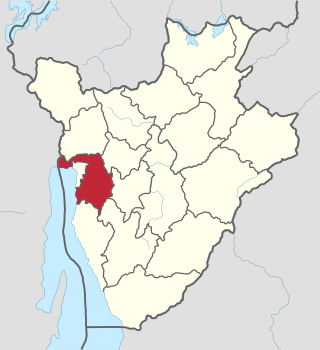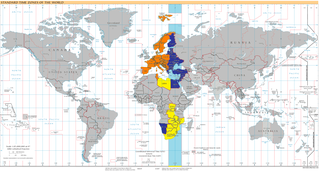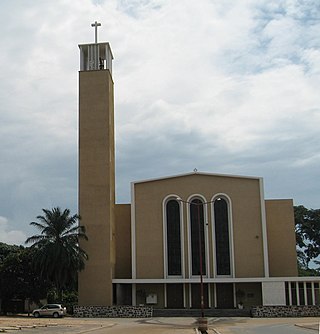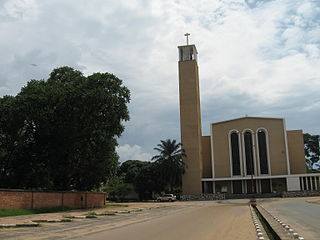Bujumbura Province is a former province of Burundi. It is now split into the Bujumbura Mairie Province (which contains the country's former capital Bujumbura) and the Bujumbura Rural Province.
Bujumbura Province is a former province of Burundi. It is now split into the Bujumbura Mairie Province (which contains the country's former capital Bujumbura) and the Bujumbura Rural Province.

Bujumbura, formerly Usumbura, is the economic capital, largest city and main port of Burundi. It ships most of the country's chief export, coffee, as well as cotton and tin ore. Bujumbura was formerly the country's normal capital. In late December 2018, Burundian president Pierre Nkurunziza announced that he would follow through on a 2007 promise to return Gitega its former political capital status, with Bujumbura remaining as economical capital and center of commerce. A vote in the Parliament of Burundi made the change official on 16 January 2019, with all branches of government expected to move to Gitega within three years.

Burundi is divided into eighteen provinces, each named after their respective capital with the exception of Bujumbura Rural.

Bujumbura Mairie Province is one of the eighteen provinces of Burundi. It consists entirely of the city of Bujumbura, Burundi's former capital.

Bujumbura Rural Province is one of the 18 provinces of Burundi. Former President of Burundi Cyprien Ntaryamira was born here.

Gitega, formerly Kitega, is the political capital of Burundi. Located in the centre of the country, in the Burundian central plateau roughly 62 kilometres (39 mi) east of Bujumbura, the largest city and former political capital, Gitega is also the second largest city and former royal capital of the Kingdom of Burundi until its abolition in 1966. In late December 2018, Burundian president Pierre Nkurunziza announced that he would follow on a 2007 promise to return Gitega its former political capital status, with Bujumbura remaining as economic capital and centre of commerce. A vote in the Parliament of Burundi made the change official on 16 January 2019, with all branches of government expected to move in over three years.

UTC+02:00 is an identifier for a time offset from UTC of +02:00. In ISO 8601, the associated time would be written as 2020-11-08T23:41:45+02:00. This time is used in:
Intwari Stadium is a multi-purpose stadium in Bujumbura, Burundi. It is currently used mostly for football matches. The stadium holds 10,000. It was formerly named after former Burundian prime minister and independence hero, Louis Rwagasore before being renamed on 1 July 2019.

Melchior Ndadaye International Airport is an airport in Bujumbura, the former capital of Burundi. It is Burundi's only international airport and the only one with a paved runway.
The Burundi Ligue A, also called Primus Ligue for sponsorship reasons, is the highest division in football in Burundi. The league was formed in 1972 and has 16 teams. They play 30 rounds home and away during a season.
The Province of the Anglican Church of Burundi is a province of the Anglican Communion, located in East Africa between Tanzania, Rwanda, Kenya, and the Congo. The Archbishop and Primate of Burundi is Sixbert Macumi.

The Roman Catholic Archdiocese of Bujumbura is the Metropolitan See for the Ecclesiastical province of Bujumbura in Burundi.
Mount Heha is the highest mountain in Burundi and the highest point in the Burundi Highlands mountain range. It is located in the Bujumbura Rural province of Burundi and it lies approximately 20 km to the east of Lake Tanganyika and about 30 km to the southeast of Bujumbura, the largest city and former capital of Burundi.

Burundi is a unitary state which is sub-divided at three levels: provinces, communes, and collines (hills).
These are some of the articles related to Burundi on the English Wikipedia:

Burundi is one of the poor African countries with heavy burden of both communicable, maternal, neonatal, nutritional, and non-communicable diseases. The burden of communicable diseases generally outweighs the burden of other diseases. Mothers and children are among those most vulnerable to this burden.
Prostitution in Burundi is illegal but is commonplace and on the rise. Prostitution is prevalent in all areas of the country, and especially in the largest city, Bujumbura, and prior to the security crisis in 2015, the tourist areas around Lake Tanganyika. UNAIDS estimate there are 51,000 prostitutes in Burundi. Many women have turned to prostitution due to poverty.
Matana is a Burundian town and colline, seat of the Commune of Matana, in Bururi Province.

Rumonge Province is one of the eighteen provinces of Burundi. It was created on 26 March 2015 by combining the communes of Burambi, Buyengero and Rumonge, previously part of Bururi Province, with the Bugarama and Muhuta communes previously belonging to Bujumbura Rural Province.

The Regina Mundi Cathedral is Catholic church in the city of Bujumbura, the former capital of the African country of Burundi.
The Anglican dioceses of Burundi are the Anglican presence in Burundi; together they form the Province of the Anglican Church of Burundi. The Anglican churches of the area were under the authority of the Archbishop of Canterbury until 1965, when the Province of Uganda and Ruanda-Urundi was created; Burundi was then part of the Province of Rwanda, Burundi, and Boga-Zaire from 1980 until its own church province was erected in 1992.